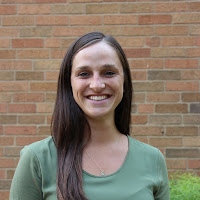The following is a reflection about the second station of the cross prepared by Laura LeBrun, a Volunteer living in the McKinley Park Community. Laura is working at Perspectives High School of Technology in the Auburn Gresham neighborhood and she shared her story at Amate House’s Stations of the Cross evening of reflection on April 5, 2017.

From the Gospel according to Matthew. 27:27-31
Then the soldiers of the governor took Jesus into the governor's headquarters, and they gathered the whole cohort around him. They stripped him and put a scarlet robe on him, and after twisting some thorns into a crown, they put it on his head. They put a reed in his right hand and knelt before him and mocked him, saying, "Hail, King of the Jews!" They spat on him, and took the reed and struck him on the head. After mocking him, they stripped him of the robe and put his own clothes on him. Then they led him away to crucify him. To a random passerby, Jesus may have seemed to deserve such punishment. Who is this “King of the Jews” who acts as though he deserves special treatment? On the surface, He seems self-indulgent, self-righteous, and even borderline heretic. If one does not venture further into Jesus’ story, He seems worthy of the punishment set upon Him.
Likewise, when one thinks of the youth in impoverished schools, they tend to take things at the surface level. These kids are lazy. They don’t care. They’ll never amount to much. As time goes on, even though I can get frustrated with their behavior, I realize that, like Jesus, these teenagers cannot be defined through broad generalizations. The parallels between their lives are striking. My students are born into this world with their lives defined. Jesus did not choose to be the Son of God; however, he took up His cross, even when it resulted in His death. My students didn’t choose to grow up surrounded by poverty, violence, emotional and physical struggles, and many other debilitating characteristics. Despite their burden, however, they take up their cross, even when that cross is challenging beyond what most people can imagine. Through birth, the framework of their lives is decided.
In 2016, sixteen-year-old Pierre Loury was shot and killed by a Chicago police officer as he evaded them by jumping a fence. Pierre’s story was brought to me when a student wrote about being friends with Loury in a class assignment. I pored over news articles about him, wondering how a child could end up in such a situation. For Pierre, though he grew up in North Lawndale, was very similar to the teens I interact with on a daily basis. He was not perfect; he had juvenile court records, smoked marijuana, ditched class, and had a heroin charge by fifteen. Looking at the surface level, Pierre may have, to some, seemed deserving of such a death. But upon reading testaments from his friends and family, I struggle to accept this sentiment. At sixteen, he got a tattoo to memorialize a fellow gang member who was slain. His younger siblings looked up to him, and he loved making up rhymes and listening to music. One of his friends commented, “I want him to be remembered as someone who loved and cared about everyone. And even though he wasn’t the best kid, he had the best heart.”
Turning to the gang life isn’t an ideal solution, but for kids in some Chicago communities, gang life is necessary for survival. In an interview with The Chicago Tribune, Judge Michael Toomin, who presides over Cook County’s juvenile court system, notes “[Kids] turn to gangs because gangs give them friends, give them some structure, give them protections…”
 |
| Laura reads her reflection on the second station at St. Maurice Church in McKinley Park. |
On the surface level, joining a gang doesn’t make sense. Deeper down, it is a cross given simply by being born into the wrong neighborhood. Like Jesus, they carry this cross without complaint. And like Jesus, they may be mocked and dismissed as thugs, worthless, and underserving by those who do not understand.
I have been fortunate enough to experience many joys with my students. Through my experience as an On Track and High School Completion Coach in Chicago’s Auburn Gresham neighborhood, I have learned to look beyond these gang members (although, I will admit I was nervous at first) and see the wonderful young adults they truly are. They continue to teach me to look deeper, even now. The other day, my student was explaining to me about how he did not want to go to school when he casually added, “I got shot at.” He didn’t even add punctuation; just “I didn’t want to go I got shot at yesterday.” In my casual, I’m-a-teacher-so-I-technically-can’t-acknowledge-that-you’re-in-a-gang voice, I inquired, “Well, was what you were doing legal?” He responded, “But you don’t get it, you don’t abandon your brothers when they’re getting shot at.”
He’s right. I don’t get it, for I did not grow up in this neighborhood, in this life, in this sense of poverty, where crime can emerge even while you are walking home from school. My cross is different than theirs, but like them, I need to take up my cross, even if my teacher doesn’t understand, even if the general public doesn’t understand, even if I am being mocked and stripped and crucified. For by taking up your cross, even when you are the only one that knows the good that comes from it, you are teaching everyone around you how to live.
These are your brothers. You can’t abandon them. You just need to pick up that cross and persevere through those struggles for the sake of others, no matter what these struggles are. My precious child: I wish you weren’t on the streets, but I love that you are willing to express compassion and love, no matter what cross you were born to carry.
 As you walk around Chicago, there will be no sounds of nails being hammered into wood. You will not hear someone crying out in agony because nails are being sent through their hands and feet. You will not see a man hanging from tree forgiving those who put him up there. You will not see a gruesome sight like this. However, though not identical to this exact sight, every day I witness something very similar to this, and I am confident that everyone witnesses these events. If one does not see them, then they must look harder.
As you walk around Chicago, there will be no sounds of nails being hammered into wood. You will not hear someone crying out in agony because nails are being sent through their hands and feet. You will not see a man hanging from tree forgiving those who put him up there. You will not see a gruesome sight like this. However, though not identical to this exact sight, every day I witness something very similar to this, and I am confident that everyone witnesses these events. If one does not see them, then they must look harder.






